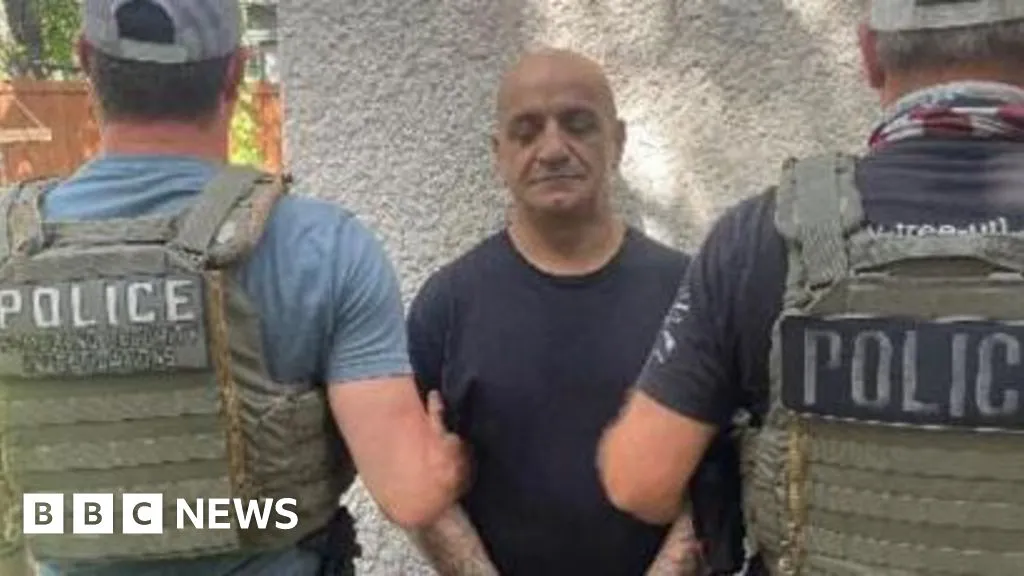Within two days of the Iranian strikes, US immigration officials arrested 11 Iranian citizens in the US, including men with alleged ties to Iran's military and paramilitary proxy groups.
Authorities have not suggested any of those arrested were involved or linked to a specific plot in the US, and the Department of Homeland Security has said there are no credible threats currently to US soil.
Immigration and Customs Enforcement (ICE) told CBS, the BBC's news partner, that the arrests were part of President Donald Trump's efforts to deport immigrants in the US illegally.
One man arrested in Minnesota is an alleged former member of the Islamic Revolutionary Guard who has "admitted connections to Hezbollah", according to ICE.
Another man who was arrested In Mississippi had been living in the US for eight years and had allegedly been designated by the US as a known or suspected terrorist. Another man arrested in Alabama allegedly served for three years as a sniper in Iran's military before moving to the US in 2024.
The arrests came after DHS and the FBI hosted calls over the weekend with state leaders and hundreds of law enforcement agencies to inform them of the heightened threat environment and ensure they are being vigilant and reaching out to those who could be at risk, including those in the Jewish community, US media reported.
In recent days, Republican lawmakers and Trump administration officials have spoken often about the threat of Iranian "sleeper cells" who infiltrated the US under the Biden administration.
Although no direct or public threat has been made by Iran to attack the US homeland - and there is a current ceasefire in effect in the conflict between Iran and Israel - the country has a long history of sponsoring violent attacks in the US, says Dr Lorenzo Vidino from the George Washington University Program on Extremism.
In 1980, shortly after Iran's Islamic Revolution, an Iranian dissident was assassinated in the US state of Maryland. More recently, the US says Iran has planned assassinations of American officials, including Trump and his former National Security Adviser John Bolton.
Dozens of people with ties to Iran have been arrested in recent years, according to Dr Vidino, although many of those arrests stem from sanctions violations. He cites a man who sold restricted night-vision goggles to Iran, but adds it's unclear whether the individual had ideological ties to Iran or simply was a businessman seeking to profit.
The men most recently arrested, he suspects, had been watched by the US for some time. But agents decided to swoop in to detain them in light of the recent flare-up in violence between the US and Iran.
Other Iranians in the US have been arrested in the past while scouting potential targets for attacks.
In a separate bulletin, the National Terrorism Advisory System warned of a "heightened threat environment in the United States".
While it did not mention any specific threats, it said it to be especially vigilant against "low-level cyber attacks against US networks".
Discussions between federal and local officials regarding national security has been commonplace since the 11 September 2001 terror attacks on the US.
Terror events, mass shootings or attacks targeting a segment of the population often lead to an increased law enforcement presence and heightened security stance.
Since the US involvement in Iran, police patrols have been increased in communities nationwide at certain sensitive sites, including buildings with connections to the US or Israeli governments, or to Judaism.
Some FBI personnel, who were focusing on immigration enforcement as part of Trump's deportation goals, have reportedly been brought back to focusing on counter-terrorism, according to CBS News. On Sunday, the bureau distributed a memo to field offices telling them to focus resources on terror threats.
The FBI has not confirmed any shift in priorities. "The FBI does not comment on specific operational adjustments or personnel decisions," the agency said in a statement.
"However, we continuously assess and realign our resources to respond to the most pressing threats to our national security and to ensure the safety of the American people."
